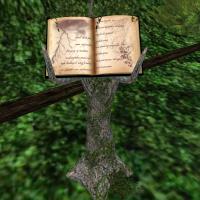The Druids tended to live outside of tribal holdings, and not in the walled villages. Bards tended to live in them, but move from one village to another, and Ovates tended to live in places of power, but not natural power per se.
Druids lived near their sacred groves. In border spots like caves, Ovates focused on seeing through the veil, while the Druid order itself focused on the sun, moon, and animal behaviours. So an Ovate might make a hut near the shore, so they could always feel that energy. Where as the Druids would gather together in the woods where all people were said to be born from anyway. In Druid belief humanity came from trees, but not all from the same trees. So people often had the same name as a tree; Rowan, Hawthorn, etc.
Was it spiritual or physical? They didn’t see a difference. So woodcutting wasn’t forbidden, no more than hunting was, but they couldn’t do it casually. Basically, what the Druids taught and practiced themselves was the cycle they saw in nature. It wasn’t wrong to fell trees, because they did fall on their own, and often they would take fallen wood in preference to standing. It wasn’t wrong to hunt animals, because animals hunt each other, but you didn’t thin the herd or take the strongest. Sort of like Egyptian culture, the difference between man-Gods and animal-Gods didn’t really exist. Thus their God of the hunt had the horns of a stag. They had “supernatural” creatures they believed in, but they were still seen to exist. They were just “invisible” like the dragon. The dragon lived in the land, thus many kings bore the name “pendragon”. Pendragon just roughly meant dragon king, or the king who respects the way of the Druids. The Druids respected the dragons themselves, and really their view wasn’t much different from the Chinese.
Was the dragon seen as a primal force? Yes. In fact, this is part of their view of creation. They have a lot in common with the Norse. The land prospered at the will of the dragon, and would fail if the dragon decided. So they needed to respect the dragon.
Did they give sacrifices? That differed, but yes. Of their livestock from time to time they did, and depending on the time and group, occasionally people. But what is often overlooked is that the biggest bulk of human sacrifices were voluntary.
Their own people or others? Usually others, or those of their own people who were seen to have committed a serious crime. We aren’t better today.
It was likely a way of honour for those who were sacrificed? Yes. In the case of the voluntary sacrifices it was. They mostly left human beings alone though. The Romans themselves, who were known for the “pax romanum”, the Roman peace, were amazed at how well the Druids could establish peace between the tribes with just their words. Not fear, just their wisdom.
Your thoughts are welcome. Be well friends.
Travis Saunders
Dragon Intuitive
~science,mysticism,spirituality~

